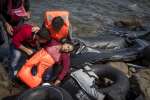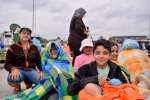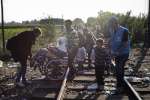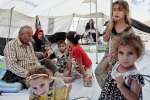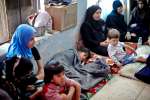- Text size
 |
|  |
|  |
| 
- عربي
UNHCR head tells humanitarian NGOs "moment of truth" has arrived
News Stories, 1 July 2015
GENEVA, July 1 (UNHCR) – UN High Commissioner for Refugees António Guterres on Wednesday outlined major challenges facing his agency and the entire humanitarian community warning that the "moment of truth had arrived" given the scale of current global challenges.
Guterres told the annual UNHCR-NGO consultations in Geneva that the current humanitarian system – facing the largest number of forcibly displaced since records began – was "broke but not broken."
"Dramatic problems in multiple regions are in contrast to decreasing support; in 2010, there were 11,000 newly displaced per day; in 2011, 14,000; in 2012, 23,000; in 2013, 32,000; in 2014, 42,500 per day," he told the opening session, adding that in such a climate strategic partnerships could not be more important.
While stressing that the humanitarian community needed to explore the cost-effectiveness of current crisis responses, Guterres said development actors must step forward to support countries and communities whose own development efforts have been devastated by the strain of hosting immense numbers of refugees.
Last month, UNHCR's Global Trends Report: World at War, said the number of people forcibly displaced at the end of 2014 as a result of war, conflict and persecution had risen to a staggering 59.5 million compared to 51.2 million a year earlier and 37.5 million a decade ago.
"The volume of refugee needs is increasing dramatically, but resources are not following," Guterres reiterated to the NGO gathering and urged them to keep on pressuring UNHCR "when needs arise".
"UNHCR counts on NGOs to help," he declared. However, Guterres also pointed out that two out of every three refugees today came from Muslim countries though the system remained very western orientated. He called for greater efforts to make sure the system was rights-based.
For the past two decades, the annual NGO consultations have brought together UNHCR and many of its 600 partner organisations worldwide. This year's theme is "In Pursuit of Solutions".
In a welcome note, Guterres wrote: "For the next three days, we have an opportunity to advance our thinking on solutions… By solutions we are not only referring to the classic durable solutions of voluntary repatriation, resettlement and local integration, but also to the broader sense of enabling refugees and other persons of concern to improve their quality of life and to enjoy their human rights."
NGOs are vital partners for UNHCR, implementing programmes for refugees and internally displaced people in some of the world's most remote and difficult places.


